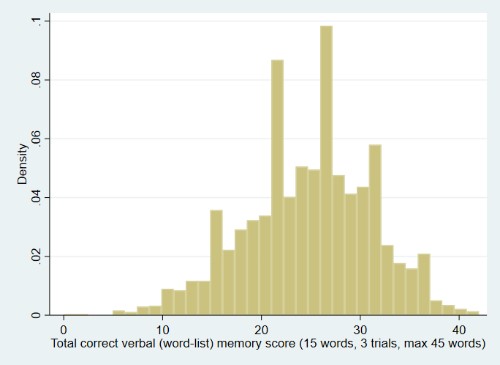The MRC National Survey of Health of Development (NSHD) assessed their cohort members (CMs) during the study’s age 43 sweep using the Verbal Learning/Word List Recall Test.
Details on this measure and the data collected from the CMs are outlined in the table below.
| Domain: | Verbal (memory) |
| Measures: | Attention |
| Short-term episodic memory | |
| Verbal memory | |
| Free-recall memory | |
| CHC: | Glr (Long-Term Storage and Retrieval) |
| Administration method: | Research nurse; face to face; pen and paper |
| Procedure: | Participants were shown a list of 15 words at a rate of one word every two seconds. They were then asked to right down as many words recalled as possible. This trial was done a total of three times, and a total score was calculated as the sum of the words correctly recalled over the three trials. |
| Link to questionnaire: | https://skylark.ucl.ac.uk/NSHD/lib/exe/fetch.php?media=questionnaires:1989_b_sc.pdf (opens in new tab) |
| Scoring: | One point for every correctly recalled word (0 - 45) |
| Item-level variable(s): | Not currently available |
| Total score/derived variable(s): | WL10189 - WL31589, WLT89 |
| Descriptives: | Raw score |
| N = 3,059 | |
| Range = 0 - 42 | |
| Mean = 24.72 | |
| SD = 6.39 | |
(click image to enlarge) |
|
| Age of participants (months): | Mean = 521.84, SD = 2.19, Range = 514 - 533 |
| Other sweep and/or cohort: | NCDS – Age 50 – Verbal Learning/Word List Recall Test (Immediate and Delayed) (1 trial only; 10 words, presented aurally) |
| NCDS – Age 61-63 – Proposed repeat of tests at age 50 | |
| BCS70 – Age 46-47 – Verbal Learning/Word List Recall Test (Immediate and Delayed) (1 trial only; 10 words, presented aurally) | |
| NSHD – Age 53 – Verbal Learning/Word List Recall Test | |
| NSHD – Age 60-64 – Verbal Learning/Word List Recall Test | |
| NSHD – Age 68-70 – Verbal Learning/Word List Recall Test | |
| Source: | This task was developed specifically for this study by the NSHD team led by Prof Bryan Rodgers. Similar tasks have been used to measure verbal learning for decades, e.g. Bush and Mosteller (1955). |
| Technical resources: | None |
| Reference examples: | Richards, M., Kuh, D., Hardy, R., & Wadsworth, M. (1999). Lifetime cognitive function and timing of the natural menopause. Neurology, 53(2), 308-308. |
| Richards, M., Shipley, B., Fuhrer, R., & Wadsworth, M. E. (2004). Cognitive ability in childhood and cognitive decline in mid-life: longitudinal birth cohort study. BMJ, 328(7439), 552. |
For the named items in the table above, links are provided to their corresponding content on CLOSER Discovery. Where a variable range is provided, full variable lists can be accessed through the ‘Variable Groups’ tab on the linked Discovery page.
Go to:
- Overview of all cognitive measures in NSHD
- Overview of adulthood cognitive measures across all studies
This page is part of CLOSER’s ‘A guide to the cognitive measures in five British birth cohort studies’.
